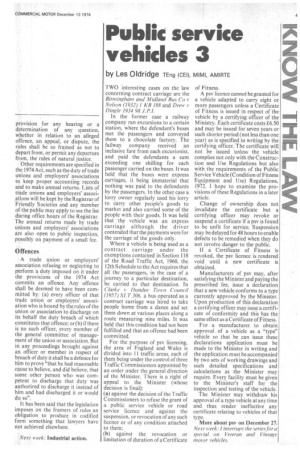Public service vehicles 3
Page 43

If you've noticed an error in this article please click here to report it so we can fix it.
by Les Oldridge TEng (CEO, MIMI, AMIRTE TWO interesting cases on the law concerning contract carriage are the Birmingham and Midland Bus Co v Nelson (1932) 1 KB 188 and Drew v Dingle 1934 98 J. P.!.
In the former case a railway company ran excursions to a certain station, where the defendant's buses met the passengers and conveyed them to a chocolate factory. The failway company received an inclusive fare from each excurionist, and paid the defendants a sum exceeding one shilling for each passenger carried on the buses. It was held that the buses were express carriages, it being immaterial that nothing was paid to the defendants by the passengers. In the other case a lorry owner regularly used his lorry to carry other people's goods to market and also carried some of the people with their goods. It was held that the vehicle was an express carriage although the driver contended that the payments were for the carriage of the goods only.
Where a vehicle is being used as a contract carriage under the exemptions contained in Section 118 of the Road Traffic Act, 1960, the 12th Schedule to the Act requires that all the passengers, in the case of a journey to a particular destination, be carried to that destination. In Clarke v Dundee Town Council (1957) SI.T 306, a bus operated as a contract carriage was hired to take people home from a dance and set them down at various places along a route measuring nine miles. It was held that this condition had not been fulfilled and that an offence had been committed.
For the purpose of psv licensing, the area of England and Wales is divided into 11 traffic areas, each of them being under the control of three Traffic Commissioners appointed by an order under the general direction of the Minister. There is a right of appeal to the Minister (whose decision is final): (a) against the decision of the Traffic Commissioners to refuse the grant of a public service vehicle or road service licence and against the suspension, or revocation of any such licence or of any condition attached to them; (b) against the revocation or limitation of duration of a Certificate of Fitness.
A psv licence cannot be granted for a vehicle adapted to carry eight or more passengers unless a Certificate of Fitness is issued in respect of the vehicle by a certifying officer of the Ministry. Each certificate costs £6.50 and may be issued for seven years or such shorter period (not less than one year) as is specified in writing by the certifying officer. The certificate will not be issued unless the vehicle complies not only with the Construction and Use Regulations but also with the requirements of the Public Service Vehicle (Condition of Fitness Equipment and Use) Regulations, 1972. I hope to examine the provisions of these Regulations in a later article.
Change of ownership does not invalidate the certificate but a certifying officer may revoke or suspend a certificate if a psv is found to be unfit for service. Suspension may be delayed for 48 hours to enable defects to be remedied when they do not involve danger to the public.
If a Certificate of Fitness is revoked, the psv licence is rendered void until a new certificate is obtained.
Manufacturers of psv may, after satisfying the Minister and paying the prescribed fee, issue a declaration that a new vehicle conforms to a type currently approved by the Minister. Upon production of this declaration a certifying officer may issue a certificate of conformity and this has the same effect as a Certificate of Fitness.
For a manufacturer to obtain approval of a vehicle as a "type" vehicle so that he can issue these declarations application must be made to the Minister in writing and the application must be accompanied by two sets of working drawings and such detailed specifications and calculations as the Minister may require. Every facility must be given to the Minister's staff for the inspection and testing of the vehicle.
The Minister may withdraw his approval of a type vehicle at any time and thus render ineffective any certificate relating to vehicles of that type.
More about psv on December 27. ,Vext week: I interrupt the series for special on Veteran and Vintage motor vehicles.




























































































